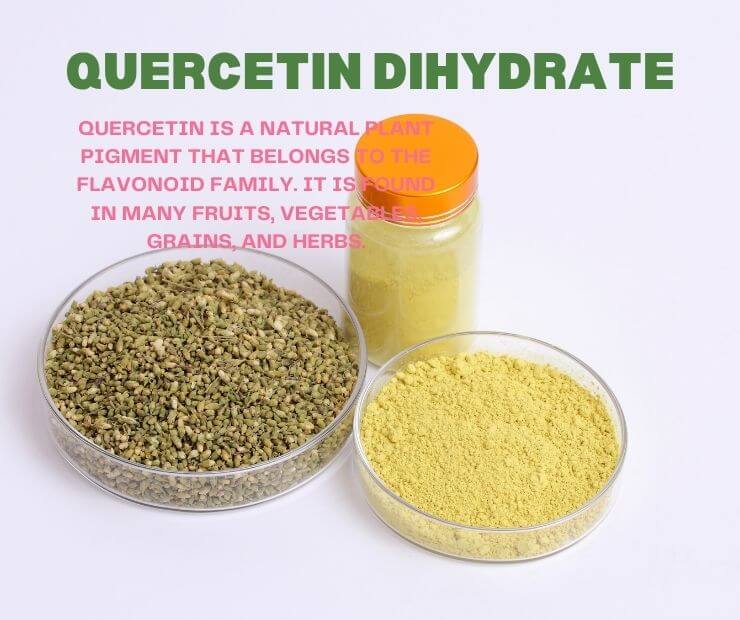What Is Quercetin Dihydrate? – All You Need to Know
Quercetin Dihydrate is a natural plant pigment and belongs to the flavonoid family. And found in many fruits, vegetables, grains, and herbs. Quercetin has long been known to have antioxidant properties, and several studies suggest it has anticancer effects. However, the relatively poor bioavailability of quercetin limits its clinical applications.
Quercetin has various forms, including aglycone and glycoside. Although the aglycone form prefers quercetin supplementation, it isn’t absorbed by the body as it is rapidly metabolized in the intestine. It converted to quercetin 3-O-L-rhamnopyranoside (quercetin rhamnoside), which has a better absorption ability. The body absorbs the glycoside form and helps with its clinical applications.
How Do You Take Quercetin?
- Two forms of quercetin are typically used in human clinical research: quercetin dihydrate and quercetin aglycone. Unfortunately, Quercetin Dihydrate does not appear to be available on the market for human consumption. However, quercetin aglycone is used as a supplement.
- Quercetin aglycone comes in two formulations: pure and mixed with another flavonoid, myricetin. Both forms are on sale as dietary supplements in the US and Europe. Quercetin can also be found with other accessories, including vitamin C and green tea extract.
- The recommended dosage varies from one source to another, depending on the type of quercetin used and other factors. However, the recommended dose is usually between 100-1,000mg for quercetin aglycone and 200-400mg for quercetin dihydrate.
In Human Clinical Trials
- Several studies suggest that quercetin has anticancer effects. For example, Quercetin Dihydrate was found to decrease the number of abnormal cells in the colon and prevent the proliferation of colon cancer cells. Other studies suggested that quercetin had anticancer effects on the prostate, lungs, and stomach. However, it is still not clear whether the anticancer effect of quercetin is due to its antioxidant or anti-inflammatory properties.
- Quercetin is found to have anti-clotting activities, which can help prevent the formation of blood clots within the body. In addition, studies have been conducted on quercetin’s effect on platelet aggregation, a critical aspect of the development of blood clots. For example, one study found that eating quercetin-rich foods can reduce platelet aggregation and may protect against coronary heart disease. However, no studies confirmed these results.
- Quercetin may have anti-diabetic effects; several studies suggest that oral supplementation with quercetin is associated with lower blood glucose levels in people with type 2 diabetes. However, more research is needed despite these promising results in this area.
Quercetin Dihydrate (500 mg) –
Dosage: Initial Dose – 3-10 g/day for three to six weeks. Maintenance Dose – 1-3 g/day for months to years.
Benefits of Quercetin Supplements
A recent study found that quercetin supplements can increase HDL cholesterol, decrease triglycerides, and regulate blood pressure in overweight individuals with high cardiovascular risk factors.
Myricetin (500 mg) –
Dosage: Initial Dose – 5-20 g/day for three to six weeks. Maintenance Dose – 1-5 g/day for months to years.
Benefits of Quercetin Supplements
A study on healthy people suggested that a high intake of quercetin, dihydrate, and myricetin can lower specific inflammatory markers.
Benefits of Quercetin –
- Quercetin is a powerful antioxidant and may protect against oxidative stress and the development of certain chronic diseases. In addition, studies have suggested that quercetin supplementation has anticancer effects. It may also prevent atherogenesis, thus preventing the development of coronary heart disease.
- Studies suggest that quercetin reduces the risk of developing type 2 diabetes by helping improve insulin sensitivity and prevent insulin resistance from developing. It may also help lower elevated blood sugar levels due to its ability to increase insulin release. Quercetin is also a vasodilator, opening blood vessels, improving blood flow, and lowering high blood pressure.
Quercetin is an antioxidant and is used in the treatment of various chronic diseases. It can prevent colon cancer, type 2 diabetes, and inflammation. However, more research must confirm these results and explore the mechanisms behind quercetin’s protective effects. Quercetin Dihydrate naturally exists in various fruits, vegetables, and grains. It can treat various diseases since ancient times; there are still many traditional uses for this natural ingredient.








